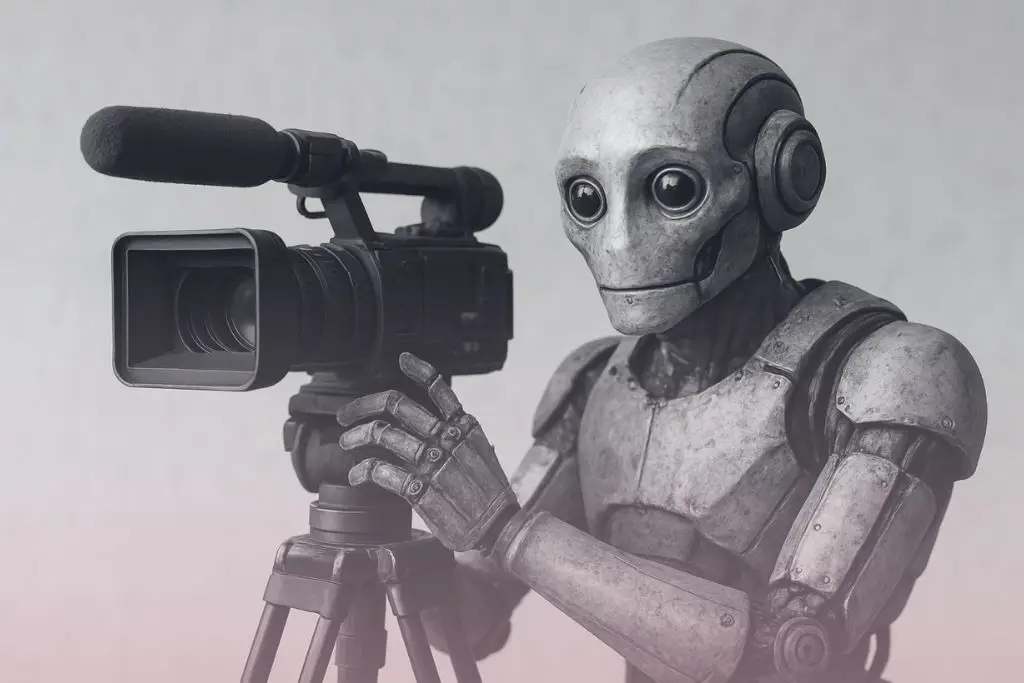A Few Thoughts on AI for Marketing
First things first. You SHOULD take advantage of artificial intelligence (AI). No doubts about that, if you ask me. BUT, you must keep in mind that artificial intelligence can’t replace a human brain (…yet). Therefore, if not done right, using AI in your marketing can be a short-term arbitrage.
Now, a Proper Intro
Today, marketing teams and (small) biz owners are constantly looking for innovative ways to engage audiences, attract customers, make sales…Basically, all of us are constantly on a hunt to achieve our goals faster, easier, better.
We must agree that artificial intelligence is a game changer, so incorporating AI into marketing efforts has literally become crucial in achieving those goals.
Now that you’re here, let’s explore the concept of AI marketing, how it can revolutionize your marketing strategy… BUT ONLY IF implemented correctly.
Ok, let’s dive in!
…btw, this article isn’t written by AI, I mean, that wouldn’t make much sense, agree? 🙂
What is AI for Marketing?
| AI for marketing refers to the use of AI technology, particularly AI content generation tools, to automate marketing tasks, streamline processes, and unleash creativity. These tools leverage generative AI, which means they can generate text and images based on existing data from the internet. It’s important to note that AI is not meant to replace human marketers but rather to augment their work and enhance their productivity. |
What’s so Good About Using AI in Marketing
1. Increased Efficiency
One of the major advantages of AI marketing is its ability to boost efficiency. For example, by automating content creation processes, businesses can save time and resources that can be better utilized elsewhere. AI can help with tasks such as generating content briefs, creating outlines, and even producing high-quality articles at a faster pace. It can also assist in writing blog titles, meta descriptions, and other copy, thereby speeding up the entire content production process.
The same can be applied to many other aspects of marketing. For instance, just imagine how much work would it take for a designer to manually remove a background from an image? I mean, does anyone still actually do that?! 🤔
2. Improved ROI
AI marketing tools provide detailed insights and data-driven recommendations that enable businesses to make informed decisions about their marketing spend and campaign performance.
By leveraging AI as a co-pilot, you can optimize your campaigns, test ad copy variations, and create personalized sales emails. This eventually leads to better ROI as marketing efforts become more targeted and aligned with audience needs.
The ability to analyze vast amounts of data and generate actionable insights certainly goes in favor of AI-powered tools from traditional methods.
3. Sparks Creativity
Creativity is essential in marketing, but it can sometimes be challenging to come up with fresh ideas consistently.
I’ll use AI content generators once again as an example. They can serve as valuable brainstorming partners, generate really amazing ideas and help with overcoming writer’s block. These tools can quickly produce content variations, allowing marketers to explore different angles and perspectives.
Then, almost every time I’ve used AI for design purposes, my reaction was literally – WOW 😮. I got all sorts of visual solutions that would never cross my mind.
Definitely, by collaborating with AI, marketers (…or anyone doing marketing) can unlock creative potential and produce engaging and innovative campaigns.
4. Better Cross-Collaboration
AI tools provide a centralized platform for teams to collaborate and create assets that align with the brand’s voice and style.
Did you know that you are able to set your own brand guidelines in ChatGPT and get prompt results based on it?
With AI, you can ensure consistency across various marketing channels and maintain a unified brand identity. By eliminating silos and streamlining the content creation process, teams can work together more efficiently and deliver cohesive campaigns that resonate with their audience.
The Real Question: How to Use AI in Marketing?
Well, AI can be integrated into various marketing channels to enhance both efficiency and effectiveness.
Let’s explore some useful ways AI can be leveraged in key marketing areas.
1. AI for Blog Writing
If you have done your content strategy homework, you’ll know that Writing high-quality blog content is crucial for attracting and engaging audiences. AI tools can assist writers by providing content briefs, generating long-form content quickly, and even suggesting blog titles and descriptions. Yes, these tools are productivity boosters, but it’s important to note that AI-generated content still requires human review and editing to ensure accuracy and maintain quality.
Tools I personally recommend:
- Writesonic
- Copy AI
- Jasper
- ChatGPT by using the right prompts (I can help you with that ⬇️)
2. AI for Copywriting
- Writesonic
- Copy AI
- Jasper
- Creator AI
- Wordtune
- ChatGPT by using the right prompts (Have you downloaded my FREE 40 ChatGPT marketing prompts?
Copywriting plays a vital role in marketing campaigns, and AI tools excel in creating short-form content! Don’t be shy to leverage AI copywriting tools to generate ad copy, customized headlines, email subject lines, landing page copy, and one-pagers.
Again, it is essential that a human fine-tunes the generated content and aligns it with brand guidelines, main goals, etc.
Example of Writesonic’s features
3. AI for SEO
Search engine optimization (SEO) is a critical aspect of marketing, and AI can significantly enhance SEO efforts. AI in SEO usually refers to content tools that can assist SEO professionals in keyword research, creating outlines based on SERP research, producing high-quality articles at a faster pace, optimizing older content, and generating blog titles and meta descriptions.
Make sure to check out ➡️ The Controversy Around AI in SEO and How to Find Solutions
I think that by now it goes without saying that human review and editing are necessary to ensure the content meets quality standards before publishing.
Tools I personally recommend:
- Scalenut
- NeuronWriter
- RankIQ
- Alli AI
- Outranking
- Diib
- GrowthBar
- Marketbrew
- Frase
- Surfer SEO
- Jasper
- Writesonic
- ChatGPT
4. AI for Email Marketing
Email marketing remains one of the most effective channels for engaging customers. AI tools can help marketers create personalized sales emails, generate high-performing subject lines, and even respond to customer inquiries with a friendly tone.
These tools enable teams to streamline email communication, save time, and enhance personalization.
Oh, but here human oversight is crucial! A human touch will not only ensure email content aligns with brand voice and objectives, but make sure the main message is communicated correctly.
Tools I personally recommend:
Example of ActiveCampaign’s AI feature
5. AI for Social Media
The above mentioned AI content tools provide the ability to create engaging social media content – quickly. From generating engaging Instagram captions or for Meta ads to writing LinkedIn articles and crafting viral video scripts (yes, it works!)
Further, AI tools can come in handy when it comes to content creation across various social media platforms. You can experiment with different content formats and therefore, optimize your social media presence.
Tools I personally recommend:
- AdCreative
- Writesonic
- Hunch
- Copy AI
- ChatGPT again, with the right prompts (That’s why you should definitely download my FREE 40 ChatGPT marketing prompts)
6. AI for Product Marketing
Product marketing often involves creating various assets and messaging for different marketing channels. AI content tools can streamline the process by generating multiple assets from a single core message.
You can upload a campaign brief and use AI to create blog posts, social media captions, press releases, and other marketing materials. This ensures consistent messaging and (obviously) saves time.
Tools I personally recommend:
7. AI for Design
I’ve already tackled this topic, but I need to emphasize that AI is making its mark in the design realm!
AI art tools enable designers to spark creativity and produce visually appealing assets quickly. With AI-powered design tools, both designers but also non-designers can create brand redesigns, infographics, ebook covers, and website visuals effortlessly.
These tools act as creative companions that can assist you in generating professional and visually stunning visuals.
Okay, needless to say that human designers still play a crucial role in refining and fine-tuning the generated designs. Human talent is still irreplaceable!
Tools I personally recommend:
- Midjourney
- DALL-E 3
- Canva (great AI features)
- ChatGPT (premium plan as it has great apps you can use for design)
- Arthiphoria
- Adobe Firefly
Example of Canva’s AI features
How to Develop an AI Marketing Strategy
Now that you are familiar with what AI can do for your marketing, it’s time to create a proper AI marketing strategy. However, developing a good one requires careful consideration and planning.
Here are some key tips on how to approach this process effectively.
Potential Challenges of Getting Started
Introducing AI to your team may require overcoming resistance and gaining support from leadership, or team members.
Start by piloting AI in small ways and demonstrating its value. Highlight the positive impact AI can have on efficiency, productivity, and results. Show how AI can automate monotonous tasks, act as a thought partner, and enhance team performance.
Luckily, most of the tools have free trials. 🙂
AI Marketing Strategy Tips
- To generate ideas: Harness AI to create variations on topics or ad copy. Broaden your content strategy and explore new perspectives by experimenting with multiple prompt versions.
- To boost productivity: Use AI to break through writer’s block or quickly turn your content into fully developed campaigns.
- To adapt and align: Employ AI to tailor existing content for different audiences, industries, or languages, ensuring your messaging stays relevant and impactful.
- To optimize: Conduct rapid, AI-driven tests and experiments to enhance your content’s performance, from ad copy tweaks to email strategy hypotheses.
If you are running a company, or working in one, try to identify the gaps, redundancies, and time-consuming tasks within your team and find AI solutions that can effectively address those challenges.
Look for AI tools that can automate these tasks and streamline processes, freeing up time for more strategic and creative activities.
(Well, this requires to be aware what AI tools are out there, so make sure you follow my content 🫣)
Once the team/your boss realizes all the benefits, they will thank you – believe me! 🙂
Note: Ensure that the chosen AI tool meets your company’s security standards and aligns with your team’s specific needs and use cases.
Yup – It’s Time to Disrupt Your Marketing Strategy
In sum, AI holds transformative potential for your marketing efforts. Whether it’s crafting compelling blog content, fine-tuning SEO, or streamlining email and social media campaigns, AI stands as a powerful ally in reaching your marketing objectives. It’s time to embrace the disruptive force of AI and unlock new horizons for your marketing strategy!
BUT, once again, remember, AI is not meant to replace human marketers yet to augment their work and unlock their creative potential.
Note: Keep in mind that the effectiveness and fit of AI tools can differ based on your unique needs and preferences. It’s advisable to thoroughly assess and test these tools before weaving them into your marketing strategy.
Hey, I can always give you a hand or advice, please, don’t hesitate to reach out!


